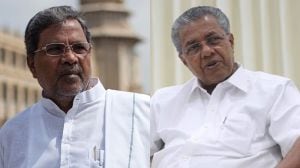EU offers Iran enhanced plan
The EU will support a 8220;proliferation-proof8221; civilian nuclear programme for Iran and will work on political and economic cooperation with that country, an EU official said on Monday.

The EU will support a 8220;proliferation-proof8221; civilian nuclear programme for Iran and will work on political and economic cooperation with that country, an EU official said on Monday.
8220;We are prepared to work on a cooperation package and support Iran8217;s development of a proliferation-proof civilian nuclear program,8221; said Austrian Foreign Minister Ursula Plassnik, whose country holds the rotating EU presidency.
Plassnik was speaking after a meeting of EU foreign ministers, where a package of enhanced incentives to Iran was being considered in order to induce Tehran to halt a nuclear programme that could be used to produce nuclear weapons.
She said the EU8217;s plan would contain three elements economic8212; assistance and political cooperation, in addition to support for the civilian nuclear programme. 8220;We remain committed to finding a diplomatic solution8230; the intention is not to push Iran into further isolation but to find a way to bring Iran back to a negotiating track,8221; Plassnik said adding 8220;but we will also look at measures to be taken should Iran continue to reject this course.8221;
Iran earlier rejected a package of economic and political incentives offered by the EU last August in return for a permanent end to uranium enrichment, but EU governments have continued to offer sweeteners, as well as pushing at the United Nations for measures that could lead to sanctions if it refuses.
The EU hopes that an enhanced offer could help persuade Iran to comply with the demands, even as Russia and China resist European and American efforts to draft a Security Council resolution under Chapter 7 of the UN Charter8212;which would make it enforceable by sanctions or, if necessary, military action.
EU officials have said that a
final proposal could be hammered out in time for a meeting of nonproliferation officials from the five permanent Security Council nations next Friday in London.
After Monday8217;s talks in Brussels EU foreign policy chief Javier Solana said that Iran had to put a 8220;complete stop8221; to uranium enrichment activities. But8230;if they want to construct a nuclear energy power plant, they would have, in cooperation with the EU and other members of the international community, the best and most sophisticated technology. If they reject that it would mean that what they want is something different,8221; he added.
Other ministers echoed that sentiment. German Foreign Minister Frank-Walter Steinmeier said that he counts on the fact that 8220;there remains common sense in the government in Tehran8221; to accept the offer.8221;
British Foreign Secretary Margaret Beckett said 8220;If they are prepared to comply with International Atomic Energy Agency recommendations there could be real advantages in tackling the problems that Iran itself says that it is seeking to address.8221;
SLOBODAN LEKIC
- 01
- 02
- 03
- 04
- 05































